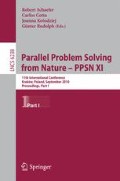Abstract
Despite the growing abundance and quality of genetic data, genetic epidemiologists continue to struggle with connecting the phenotype of common complex disease to underlying genetic markers and etiologies. In the context of gene association studies, this process is greatly complicated by phenomena such as genetic heterogeneity (GH) and epistasis (gene-gene interactions), which constitute difficult, but accessible challenges for bioinformatisists. While previous work has demonstrated the potential of using Michigan-style Learning Classifier Systems (LCSs) as a direct approach to this problem, the present study examines Pittsburgh-style LCSs, an architecturally and functionally distinct class of algorithm, linked by the common goal of evolving a solution comprised of multiple rules as opposed to a single “best” rule. This study highlights the strengths and weaknesses of the Pittsburgh-style LCS architectures (GALE and GAssist) as they are applied to the GH/epistasis problem.
Access this chapter
Tax calculation will be finalised at checkout
Purchases are for personal use only
Preview
Unable to display preview. Download preview PDF.
References
Moore, J., Asselbergs, F., Williams, S.: Bioinformatics challenges for genome-wide association studies. Bioinformatics 26(4), 445 (2010)
Thornton-Wells, T., Moore, J., Haines, J.: Genetics, statistics and human disease: analytical retooling for complexity. Trends in Genetics 20(12), 640–647 (2004)
Sing, C., Boerwinkle, E., Moll, P.: Strategies for elucidating the phenotypic and genetic heterogeneity of a chronic disease with a complex etiology. Progress in Clinical and Biological Research 194, 39 (1985)
Ritchie, M., Hahn, L., Moore, J.: Power of MDR for detecting gene-gene interactions in the presence of genotyping error, missing data, phenocopy, and genetic heterogeneity. Genetic Epidemiology 24(2), 150–157 (2003)
Ritchie, M., Edwards, T., Fanelli, T., Motsinger, A.: Genetic heterogeneity is not as threatening as you might think. Genetic Epidemiology 31(7), 797 (2007)
Digna, T., Dudek, R., Ritchie, M.: Exploring the performance of multifactor dimensionality reduction in large scale SNP studies and in the presence of genetic heterogeneity among epistatic disease models. Hum. Hered. 67, 183–192 (2009)
Ritchie, M., Hahn, L., Roodi, N., Bailey, L., Dupont, W., Parl, F., Moore, J.: MDR reveals high-order interactions among estrogen-metabolism genes in sporadic breast cancer. The American Journal of Human Genetics 69(1), 138–147 (2001)
Cordell, H.: Epistasis: what it means, what it doesn’t mean, and statistical methods to detect it in humans. Human Molecular Genetics 11(20), 2463 (2002)
Moore, J., Gilbert, J., Tsai, C., Chiang, F., Holden, T., Barney, N., White, B.: A flexible computational framework for detecting, characterizing, and interpreting statistical patterns of epistasis in genetic studies of human disease susceptibility. Journal of Theoretical Biology 241(2), 252–261 (2006)
Urbanowicz, R., Moore, J.: The Application of Michigan-Style Learning Classifier Systems to Address Genetic Heterogeneity and Epistasis in Asssociation Studies. In: Proceedings of the 12th Annual Conference on Genetic and Evolutionary Computation. ACM, New York (in Press, 2010)
Urbanowicz, R., Moore, J.: Learning Classifier Systems: A Complete Introduction, Review, and Roadmap. Journal of Artificial Evolution and Applications (2009)
Llora, X., Garrell, J.: Automatic Classification and Artificial Life Models. In: Proceedings of Learning Workshop IEEE and Univesidad Carlos III (2000)
Llora, X., Garrell, J., et al.: Knowledge-independent data mining with fine-grained parallel evolutionary algorithms. In: Proceedings of the Third Genetic and Evolutionary Computation Conference, pp. 461–468. Morgan Kaufmann, Citeseer (2001)
Bacardit, J.: Pittsburgh genetic-based machine learning in the data mining era: representations, generalization, and run-time. PhD thesis, Enginyeria i Arquitectura La Salle, Ramon Llull University, Barcelona, European Union, Catalonia, Spain (2004)
De Jong, K., Spears, W.: Learning concept classification rules using genetic algorithms. In: Proceedings of the Twelfth International Joint Conference on Artificial Intelligence, Citeseer, pp. 651–656 (1991)
Author information
Authors and Affiliations
Editor information
Editors and Affiliations
Rights and permissions
Copyright information
© 2010 Springer-Verlag Berlin Heidelberg
About this paper
Cite this paper
Urbanowicz, R.J., Moore, J.H. (2010). The Application of Pittsburgh-Style Learning Classifier Systems to Address Genetic Heterogeneity and Epistasis in Association Studies. In: Schaefer, R., Cotta, C., Kołodziej, J., Rudolph, G. (eds) Parallel Problem Solving from Nature, PPSN XI. PPSN 2010. Lecture Notes in Computer Science, vol 6238. Springer, Berlin, Heidelberg. https://doi.org/10.1007/978-3-642-15844-5_41
Download citation
DOI: https://doi.org/10.1007/978-3-642-15844-5_41
Publisher Name: Springer, Berlin, Heidelberg
Print ISBN: 978-3-642-15843-8
Online ISBN: 978-3-642-15844-5
eBook Packages: Computer ScienceComputer Science (R0)

